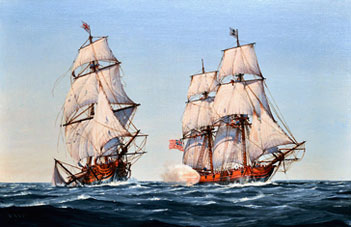Introduction
Sailors and their ships have always been pulled into wars. Whalemen were no exception. Their slow-moving vessels that traveled without cannons or naval protection became easy targets of aggression. Whalemen who tried to deliver cargo to port found their ships blockaded or seized. Many vessels were stripped of their valuable freight and some were sunk. Crew members were taken prisoner or forced into wartime service. Thus whaling ships played an important part in three of America’s biggest wars: the Revolutionary War, the War of 1812 and the Civil War.
The American Revolution
Before the Revolutionary War had even begun, two whaleships, the Dartmouth of New Bedford and the Beaver of Nantucket played leading roles in the Boston Tea Party, an incident that helped bring about the declaration of war. Both ships had taken cargos of whale oil to London from the colonies in 1773 and were hired by the East India Company to bring tea back to Massachusetts. On December 16th they were in Boston Harbor, along with a third ship, the Eleanor from England, when colonists disguised as Native Americans came aboard and dumped all the tea into the harbor. These local radicals were angered by Britain’s taxation on tea and other goods. After this raid of the Dartmouth and the Beaver, the ships sailed on to Nantucket and resumed oil shipments to England. Tensions mounted between English politicians and the American colonies.

Wikimedia Commons